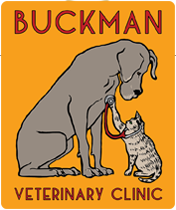Wellness Care
Wellness services and preventative care are the foundation to giving our pets a long, healthy, comfortable, active life! At Buckman Veterinary Clinic, we pride ourselves on knowing your pets and family as well as the preventative care needed to keep them fit and healthy. Wellness care has a number of facets:
Understanding your pet’s lifestyle
Is your dog a couch potato whose travels extend to the backyard fence line or has she sniffed from Hood to Coast? Is his day not complete until he has traded tales with his buddies at doggie daycare or run three laps around the Sandy River Delta before you finished your morning coffee? Is your cat the king of the neighborhood, or is bird watching from the condo window more his style? Some problems can happen to any pet, but where they live and travel can affect their risk of infections, parasites, and other diseases. Talking with us about your pet’s lifestyle will help us match the correct wellness care to their needs.
Early disease detection
When your pet comes in for a visit we will be checking them out from nose to tail. We are looking for any clues to problems, or changes in their physique or demeanor, that could indicate a change in their health. We also need you to tell us any changes you may have noticed at home in their behavior, appearance, or attitude. Even small changes that can be dismissed as “aging” are sometimes symptoms of problems we can help. Catching and treating problems early improves our ability to heal pets, limits their discomfort, and often costs a lot less than waiting until problems are more overt and emergent. In addition to a thorough exam and history, basic laboratory screening of organ function and common diseases can greatly enhance our ability to detect disease before it is severe enough to affect a pet’s behavior.
Nutrition and weight management
What and how much you feed your pet can have a major impact on their health. When you come in for your visit we will pay close attention to your pet’s figure and muscle strength, and also want to know what they eat in a typical day. Wandering the aisles of a pet food store or reading the rampant feeding advice on the Internet can be a confusing experience! Between splashy marketing, strong opinions, and minimal or conflicting nutritional information, it can be hard to know what to choose. And what if Baxter won’t eat it? Or you would like to cook Sweetpea’s food but don’t know how to nutritionally balance it? How do you find the right diet if they have allergies or other special needs? We are happy to partner with you and your pet to help with any diet concerns you have.
Parasite control
There is nothing quite like having that special four-legged friend in your life… unfortunately, they sometimes have some uninvited “friends” themselves. With Portland’s mild climate, fleas and intestinal parasites have always been a problem here. With increased travel of pets and families, heartworm and tick-borne diseases are also becoming increasingly common. Part of understanding your pet’s lifestyle is understanding which of these parasites they are at risk for, and how to prevent them.
Vaccination
Guidelines and options change over the years, but vaccination is still an important part of preventing infectious disease in pets. Happily, better research into vaccines and illnesses help us choose the safest and most efficacious immunizations, and to use them judiciously. As part of your pet’s wellness visit we will recommend vaccinations based on their lifestyle and history.
Dental health
What is not to love about that furry, purry kiss? Well… sometimes the smell for one. Dental disease is very common among pets, and it can be a sneaky problem. Most dental issues are hidden under the gum line and even pets with painful problems often have very subtle symptoms. Signs of dental pain can be as subtle as being a bit quieter or more tired, or shifting food to a different part of the mouth. If your pet has “bad breath” or gingivitis (a redness to the gum line along the teeth) these are signs of a potential problem brewing. Bacteria living in the gum tissue next to the teeth don’t just smell bad, they cause sore gums, bone destruction around the teeth, and problems in other organs as they migrate through the blood. Choices you make with your pet’s diet and chew toys can reduce dental disease, and many pets will let you incorporate tooth brushing into their routine – we can show you how! Regular professional dental cleaning with dental radiographs to look for problems under the gums are also an important part of keeping pets’ mouths healthy.
